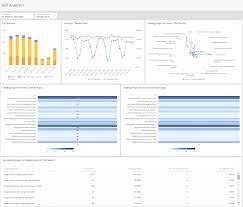Unlocking Success: The Power of Search Engine Marketing Analysis
The Importance of Search Engine Marketing Analysis
Search Engine Marketing (SEM) is a powerful tool for businesses to enhance their online visibility and drive targeted traffic to their websites. However, simply running SEM campaigns without proper analysis can lead to inefficiencies and wasted resources. This is where Search Engine Marketing Analysis plays a crucial role.
What is Search Engine Marketing Analysis?
Search Engine Marketing Analysis involves the in-depth examination of various aspects of SEM campaigns to evaluate their performance and effectiveness. It includes analysing key metrics such as click-through rates, conversion rates, cost per click, keyword performance, and overall return on investment.
The Benefits of SEM Analysis
By conducting thorough SEM analysis, businesses can gain valuable insights into the performance of their campaigns and make data-driven decisions to optimise them for better results. Some key benefits of SEM analysis include:
- Optimising Campaign Performance: Identifying underperforming keywords or ads and making necessary adjustments to improve campaign effectiveness.
- Cost Efficiency: Analysing cost per click and conversion rates to ensure that budget allocation is maximised for optimal ROI.
- Competitor Benchmarking: Monitoring competitor strategies and adjusting SEM tactics accordingly to stay ahead in the competitive landscape.
- User Behaviour Insights: Understanding user behaviour through SEM data analysis helps in refining targeting strategies for better engagement.
- Data-Driven Decision Making: Using analytical insights to make informed decisions on future SEM campaigns based on past performance data.
Key Metrics in SEM Analysis
Effective SEM analysis involves tracking and interpreting various key metrics that provide valuable information about campaign performance. Some essential metrics include:
- Click-Through Rate (CTR): Indicates the percentage of users who clicked on an ad after seeing it.
- Conversion Rate: Measures the percentage of users who completed a desired action (e.g., making a purchase) after clicking on an ad.
- CPC (Cost Per Click): The amount paid by an advertiser for each click on their ad.
…
In Conclusion
In today’s competitive digital landscape, Search Engine Marketing Analysis is indispensable for businesses looking to maximise the impact of their online advertising efforts. By leveraging analytical insights derived from SEM data, businesses can refine their strategies, improve campaign performance, and achieve sustainable growth in the digital realm.
Maximising SEM Success: Six Key Benefits of Search Engine Marketing Analysis
- Optimises campaign performance by identifying underperforming keywords or ads.
- Enhances cost efficiency by analysing cost per click and conversion rates for better budget allocation.
- Facilitates competitor benchmarking to stay ahead in the competitive landscape.
- Provides insights into user behaviour for refining targeting strategies.
- Supports data-driven decision making based on past performance data.
- Helps businesses make informed decisions on future SEM campaigns.
Challenges in Search Engine Marketing Analysis: Navigating Time, Complexity, and Cost
- 1. Time-Consuming
- 2. Complexity
- 3. Costly Tools
- 4. Data Overload
- 5. Misinterpretation Risk
- 6. Continuous Monitoring Needed
- 7. Skill Requirement
Optimises campaign performance by identifying underperforming keywords or ads.
Search Engine Marketing Analysis offers a significant advantage by optimising campaign performance through the identification of underperforming keywords or ads. By scrutinising key metrics and data, businesses can pinpoint which aspects of their SEM campaigns are not yielding desired results. This insight allows for strategic adjustments to be made, such as refining keyword targeting or revising ad content, ultimately leading to improved effectiveness and better ROI for the overall marketing efforts.
Enhances cost efficiency by analysing cost per click and conversion rates for better budget allocation.
Search Engine Marketing Analysis offers a significant advantage by enhancing cost efficiency through the detailed examination of metrics such as cost per click and conversion rates. By analysing these key factors, businesses can make informed decisions on budget allocation, ensuring that resources are optimally utilised to maximise return on investment. This proactive approach not only helps in reducing unnecessary expenses but also enables companies to allocate their budget strategically towards areas that yield higher conversion rates, ultimately leading to improved campaign performance and cost-effectiveness.
Facilitates competitor benchmarking to stay ahead in the competitive landscape.
Search Engine Marketing Analysis offers the valuable advantage of facilitating competitor benchmarking, enabling businesses to closely monitor and analyse the SEM strategies employed by their competitors. By gaining insights into competitor tactics, businesses can adapt and refine their own SEM campaigns to stay ahead in the fiercely competitive digital landscape. This proactive approach not only helps in identifying emerging trends and best practices but also empowers businesses to make strategic adjustments that ensure they maintain a competitive edge and continue to attract targeted traffic effectively.
Provides insights into user behaviour for refining targeting strategies.
Search Engine Marketing Analysis offers a valuable pro by providing deep insights into user behaviour, enabling businesses to refine their targeting strategies effectively. By understanding how users interact with SEM campaigns, businesses can tailor their approach to better resonate with their target audience. This data-driven approach not only enhances engagement but also increases the likelihood of converting leads into customers. Ultimately, refining targeting strategies based on user behaviour insights through SEM analysis can lead to more impactful and successful marketing campaigns.
Supports data-driven decision making based on past performance data.
Search Engine Marketing Analysis offers a significant advantage by supporting data-driven decision making based on past performance data. By analysing the results of previous SEM campaigns, businesses can extract valuable insights into what strategies worked well and what areas need improvement. This allows for informed decision-making when planning future campaigns, ensuring that resources are allocated efficiently and effectively to maximise ROI. Data-driven decisions derived from SEM analysis help businesses adapt and refine their marketing strategies to better resonate with their target audience and achieve long-term success in the competitive digital landscape.
Helps businesses make informed decisions on future SEM campaigns.
Search Engine Marketing Analysis plays a vital role in helping businesses make informed decisions regarding future SEM campaigns. By analysing past campaign performance data, businesses can identify successful strategies, pinpoint areas for improvement, and understand user behaviour patterns. This valuable insight enables businesses to refine their SEM tactics, allocate budgets more effectively, and target the right audience with tailored messaging. Ultimately, the ability to make data-driven decisions based on comprehensive analysis empowers businesses to enhance the effectiveness of their SEM campaigns and achieve greater success in reaching their marketing goals.
1. Time-Consuming
Conducting thorough Search Engine Marketing (SEM) analysis can be a time-consuming process, demanding dedicated effort and resources. From collecting and analysing data to interpreting results and implementing changes, the detailed nature of SEM analysis necessitates a significant investment of time. Businesses may find themselves allocating substantial hours towards scrutinising campaign performance metrics, which can potentially divert focus from other critical operational tasks. The time-intensive nature of SEM analysis highlights a notable challenge that organisations must navigate in their quest for digital marketing success.
2. Complexity
The complexity of analysing multiple metrics and data points in search engine marketing analysis can pose a significant challenge, particularly for inexperienced marketers. With a plethora of data to sift through and various metrics to consider, the task of interpreting and drawing meaningful insights from the data can be overwhelming. Inexperienced marketers may struggle to navigate this complexity effectively, leading to potential misinterpretation of results or difficulty in identifying actionable strategies for campaign optimisation. This complexity underscores the importance of seeking guidance from experienced professionals or investing in training to build the necessary skills for effective SEM analysis.
3. Costly Tools
One significant drawback of Search Engine Marketing Analysis is the expense associated with utilising advanced SEM analysis tools and software. Implementing comprehensive SEM analysis often requires access to sophisticated tools that come at a price, adding to the operational costs for businesses. The financial investment needed to acquire and maintain these tools can be a barrier for smaller companies or those operating on limited budgets, potentially limiting their ability to conduct in-depth SEM analysis and fully optimise their marketing campaigns.
4. Data Overload
Handling vast amounts of data from Search Engine Marketing (SEM) campaigns can present a significant challenge in the form of data overload. The sheer volume of information generated by SEM analysis can overwhelm marketers, leading to confusion and difficulty in extracting meaningful insights. Sorting through mountains of data to identify relevant metrics and trends becomes a daunting task, potentially hindering the efficiency and effectiveness of decision-making processes. Striking a balance between capturing valuable data and avoiding information overload is crucial to ensure that SEM analysis remains a productive and insightful endeavour for businesses seeking to optimise their online marketing strategies.
5. Misinterpretation Risk
Misinterpretation Risk is a significant con of Search Engine Marketing Analysis. Misinterpreting SEM analysis results can lead to misguided decisions that have the potential to harm campaign performance rather than improve it. Inaccurate interpretations of key metrics such as click-through rates, conversion rates, or cost per click may result in ineffective changes being implemented, ultimately impacting the overall success of the SEM campaigns. It is crucial for businesses to exercise caution and ensure a thorough understanding of SEM analysis data to avoid falling victim to misinterpretation risks and making detrimental decisions that could hinder their marketing efforts.
6. Continuous Monitoring Needed
One significant drawback of Search Engine Marketing (SEM) analysis is the necessity for continuous monitoring and adjustments. This aspect demands consistent attention from marketers, as SEM campaigns are dynamic and require regular updates to maintain optimal performance. The need for ongoing monitoring can be time-consuming and resource-intensive, making it challenging for marketers to allocate sufficient time and effort to ensure that SEM strategies remain effective and competitive in the ever-evolving digital landscape.
7. Skill Requirement
Effective SEM analysis demands a certain level of expertise in data interpretation and digital marketing, which may pose a challenge for some businesses. The skill requirement involved in conducting thorough SEM analysis can be a barrier for businesses lacking the necessary expertise or resources. Understanding complex data metrics, interpreting trends, and making informed decisions based on analytical insights require specialised knowledge and experience in the field of digital marketing. This limitation can hinder the ability of some businesses to fully leverage the benefits of SEM analysis and optimise their campaigns effectively.



